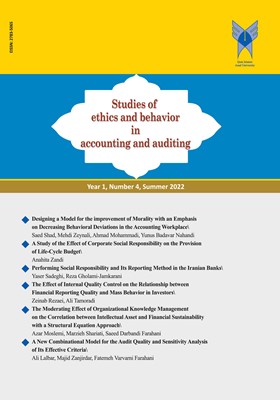A New Combinational Model for the Audit Qualityand Sensitivity Analysis of Its Effective Criteria
Subject Areas : Ethics and accounting
Ali Lalbar
1
*
,
Majid Zanjirdar
2
![]() ,
Fatemeh Varvani Farahi
3
,
Fatemeh Varvani Farahi
3
1 - Assistant Professor, Department of Accounting, Arak Branch, Islamic Azad University, Arak, Iran
2 - Associate Professor, Department of Management, Arak Branch, Islamic Azad University, Arak, Iran
3 - Master's student, Accounting Department, Arak Branch, Islamic Azad University, Arak, Iran
Keywords: Sensitivity Analysis of Friedman's Ranking, Audit Quality, Audit, Combinational Model, Tehran Stock Exchange, Sensitivity analysis,
Abstract :
The purpose of the present research is to represent a model and validate that to assess the audit quality of the accepted corporations in Tehran Stock Exchange. The first statistical population of the research consists of the scholars fully aware of the theoretical principles of the audit quality and experts in this regard and the second statistical population involves all the accepted corporations in Tehran Stock Exchange. In the qualitative part, 15 experts were chosen by purposive sampling and in the quantitative part, 147 active corporations during 2014 to 2020 were selected by systematic deletion. After studying the theoretical foundations of the research, a questionnaire based on a 5 point Likert scale was designed to recognize the effective criteria of the research. Then, using Friedman ranking method, the most effective component and its degree was determined. Finally, for the validation and sensitivity analysis, the proposed model was applied by using the obtained data from the qualitative part of the research and the calculation of the portion of each component in fluctuation of the total index. The results showed that the effective factors on audit quality can be classified into 2 main categories, 4 main components, and 20 singular indicators and that the main aspects determining the audit quality include the features of the institute and audit team, the effectiveness of the audit committee, properties of the employer, macro factors, profession, and environmental factors. Moreover, the main indicators and components do not have equal priority in determining the audit quality. It means that the more the average ranking of each aspect, the more its significance in determining the audit quality. Among 10 indicators existing in the combinational criterion of the audit quality, the only indication that is considered as the most important one in destabilizing the combinational index and one of the important ones in decreasing the average of combinational index is the audit wage which is one of the main indices in the features of the institute and the audit team.
آقائی قهی، علیرضا؛ یزدانی شهره، خانمحمدی، محمدحامد (1399). مدل مفهومی عوامل موثر بر کیفیت حسابرسی در ایران به روش نظریهپردازی زمینهای. دانش حسابرسی،20(80).
امیدوار، مریم؛ وکیلیفرد، حمیدرضا؛ عابدینی، بیژن (1399). ارائه مدلی از کیفیت حسابرسی بخش عمومی براساس روش تحلیل تم. دانش حسابرسی، ۲۰(۸۱)، ص۳۵۵-۳۱۷.
بهزادیان، فتاح؛ ایزدینیا، ناصر (1397). بررسی عوامل مؤثر بر کیفیت حسابرسی از دیدگاه حسابرسان مستقل و مدیران مالی شرکتهای پذیرفته شده در بورس اوراق بهادار تهران. پیشرفتهای حسابداری، 1(2)، ص28-6.
سلیمانی امیری، غلامرضا؛ طاهری، ماندانا (1397). رتبهبندی عوامل مؤثر بر کیفیت فعالیت حسابرسی داخلی: مدل تحلیل شبکه (ANP). دانش حسابرسی، 71(1)، ص174-149.
علوی، محمد؛ قربانی، هزاد؛ رستمی، وهاب (1394). بررسی عوامل موثر بر کیفیت حسابرسی در مؤسسات حسابرسی عضو جامعه حسابداران رسمی ایران. دانش حسابرسی، 60(1).
مداحی، آزاده؛ مهرانی، کاوه؛ مشایخی، بیتا؛ رحمانی، علی (1392). تدوین مدل کیفیت حسابرسی. بورس اوراق بهادار، 6(23)، ص103-137.
مشتری دوست، تورج؛ دستگیر، محسن (1398). بررسی عوامل موثر بر کیفیت حسابرسی داخلی. تحقیقات حسابداری و حسابرسی، 41(1)، ص146-129.
مهربانپور، محمدرضا؛ بهطهائیپور، سید علیاکبر (1393). بررسی عوامل موثر بر کیفیت حسابرسی و مقایسه نحوه رتبهبندی موسسات حسابرسی در ایران با سایر موسسات بینالمللی. در تهران: کنفرانس بینالمللی حسابداری، اقتصاد و مدیریت مالی.
نیکبخت، محمدرضا؛ محمودی خوشرو، امید (1396). بررسی عوامل مؤثر بر کیفیت حسابرسی در ایران با توجه به شاخصهای هیئت نظارت بر حسابداری شرکتهای سهامی عام PCAOB. بررسیهای حسابداری و حسابرسی، 3(1).
Chouhan, V., Sharma, R.B., Goswami, Sh. & Ali, S. (2021). Factor affecting audit quality: A study of the companies listed in Bombay Stock Exchange (BSE). Academy of Accounting and Financial Studies Journal, No.2, P.1-9.
Du, J. & Zhou, G. (2014). Big N Auditors and Earnings Response Coefficients: A Comparison Study between the US and China. China Accounting and Finance Review, 16(2), P.183-201.
Joshua, L.G., Brett, S.K., Paul & N.M. (2020). Audit market concentration, audit fees, and
audit quality: A cross-country analysis of complex audit clients. J. Account. Public Policy,
DOI: https://doi.org/10.1016/j.jaccpubpol.2020.106693.
Knechel, W. & et al. (2014). Audit Quality: Insights from the Academic Literature, Auditing. A Journal of Practice & Theory American Accounting Association, 1(2), P.385-421.
Narayanaswamy, R. & Raghunandan, K. (2019). The Effect of Mandatory Audit Firm Rotation on Audit Quality, Audit Fees and Audit Market Concentration: Evidence from India. The Digital Institutional Repository of IIM Bangalore, 5(82).
Nguyen, T. & et al. (2021). Factors affecting successful quality assurance implementation in Vietnamese higher education: A qualitative study. The Journal of Asian Finance, Economics and Business, 8(1), P.271-283.
Salehi, M. & Mahmoudi, A.D. (2019). A meta-analysis approach for determinants of effective factors on audit quality: Evidence from emerging market. Journal of Accounting in Emerging Economies, 9(2).
Sherwood, M., Nagy, A. & Zimmerman, A. (2021). Qualified Audit Personnel, Office Workload, and Audit Quality. Available at: SSRN: https://ssrn.com/abstract=2965292.
Zahmatkesh, S. & Rezazadeh, J. (2018). The effect of auditor features on audit quality. Tékhne, 15(2), P.1-9
_||_
